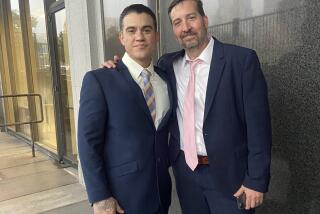Man Who Ran Over, Killed Woman Could Be Free Soon : Courts: Appellate justices decide that the judge erred in handing down the maximum sentence in the Killelea case.
- Share via
SANTA ANA — Daniel David Ornelas, now serving a 10-year prison term in Soledad for running down a Newport Beach woman in 1988 when he was drunk, may soon go free due to an appellate court decision that modifies his conviction and drastically reduces his sentence.
Ornelas was convicted in 1989 of grossly negligent vehicular manslaughter while intoxicated. Superior Court Judge Luis A. Cardenas sentenced Ornelas, then 19, to the maximum possible prison term, finding that his victim, 37-year-old Debbie Killelea--a mother of three--was “particularly vulnerable” and that Ornelas’ crime involved “great violence.”
But a three-judge panel from the 4th District Court of Appeal ruled unanimously on Tuesday that Cardenas erred both in his instructions to jurors and in his reasoning in sentencing Ornelas to the maximum term.
Because of the errors, the court modified Ornelas’ conviction by removing the finding of gross negligence--a change that reduces his maximum possible sentence from 10 to four years.
Unless the state attorney general’s office appeals the decision to the California Supreme Court, or the Orange County district attorney’s office decides to retry the entire case, Ornelas would be resentenced on the lesser conviction. And because the court also found that Cardenas’ findings of aggravation were incorrect, Ornelas would probably receive a standard two-year term for the offense.
Including time spent in jail before being sentenced, Ornelas has already served about two years. In fact, his lawyers are considering asking that he be freed immediately pending formal resentencing, said Beverly Hills attorney Conrad Petermann.
“We win so seldom these days, it’s bloody wonderful,” said Petermann, who argued the case on appeal. “With the exception of this one incident, this is an exemplary lad, a good student, he was well thought of. . . . He made a very big error, and it has been terrible on his family too. I don’t even begin to equate it with the suffering of the victim’s family. But there are lots of victims in this case.”
Deputy Atty. Gen. Esteban Hernandez said of the court’s decision:
“It’s very unfortunate. Basically, they did not accept our argument that the error (in jury instructions) was harmless.”
Hernandez said his office had not yet decided whether to appeal the case and he had not yet spoken with Orange County Deputy Dist. Atty. Bryan Brown--head of the homicide unit--about a possible retrial. Brown was unavailable Wednesday.
Ornelas, of Huntington Park, and two friends had been drinking at the beach on the Balboa Peninsula on Sept. 1, 1988, when Ornelas and one of his friends went back to their car to get a video camera. At the same time, Ornelas decided to look for a parking spot closer to the beach.
He turned down an alley and accelerated to a speed of between 32 and 58 m.p.h., according to eyewitnesses and expert testimony. Killelea, who had been involved in community efforts to slow speeding traffic on the peninsula, stood in the alley facing the car with her hands on her hips, apparently trying to get Ornelas to slow down.
At the last second, Killelea tried to jump out of the way, but Ornelas’ car veered in the same direction, and Killelea was tossed into the air and 87 feet from the point of impact and the car overturned.
The final seconds before the crash were captured on videotape by Ornelas’ friend, who had unwittingly turned on the camera while the pair were driving down the alley. Killelea’s two young sons, who can be seen on the videotape watching their mother’s death, were unhurt.
Ornelas walked away from the overturned car but was arrested a short time later nearby.
Prosecutors had sought a second-degree murder conviction, but jurors reported that they were hopelessly deadlocked on that charge. The jury instructions included explanations of three lesser crimes that Ornelas could be found guilty of, but the appeals court found that Cardenas had failed to instruct them of a fourth possibility: vehicular manslaughter with intoxication but without gross negligence.
At one point in their deliberations, the jury foreman asked Cardenas for a definition of that particular crime, but Cardenas simply referred him to the instructions already issued--a response that the appeals court called “inadequate.”
The jury’s finding that Ornelas committed vehicular manslaughter while intoxicated is not under dispute. But, the appeals court said, “the jury was left with no instruction or verdict form which would permit it to convict Ornelas for vehicular manslaughter . . . without gross negligence. In other words, having found that Ornelas committed a vehicular manslaughter while intoxicated, the jury had no choice but to also find gross negligence or to acquit him.”
More to Read
Sign up for Essential California
The most important California stories and recommendations in your inbox every morning.
You may occasionally receive promotional content from the Los Angeles Times.










